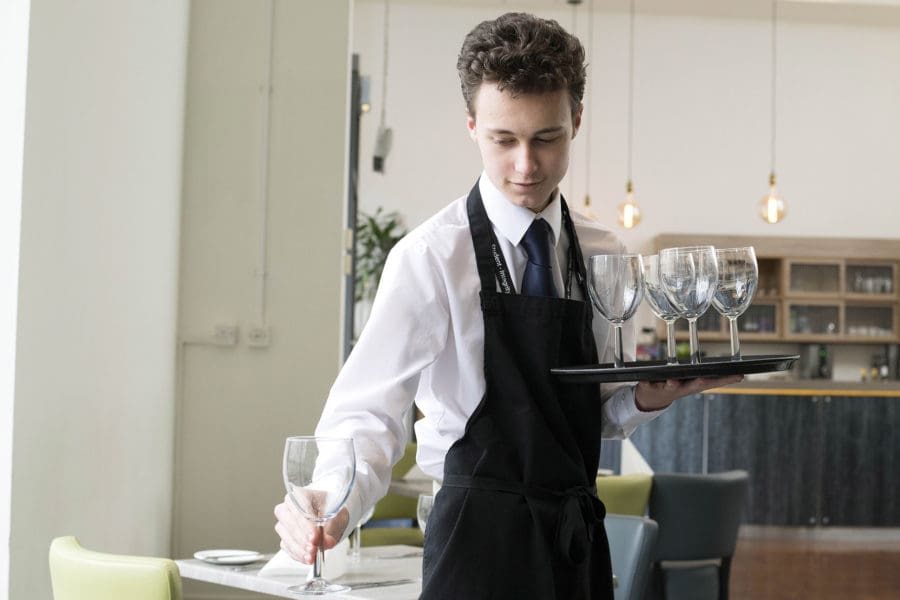Course overview
Hospitality Team Member Level 2 Apprenticeship City of Bristol CollegeHospitality team members should deliver an excellent customer experience. Their main skills will be recognising customer needs, knowing how to match them to the products and services of the business, and working as part of a team. They should ensure that every customer, whether in a restaurant, bar, hotel or a banqueting or conference setting feels welcomed and looked after.
Hospitality team members support customers and keep venues running smoothly. They are in high demand, making it a great choice for those looking to progress their careers.
Roles are incredibly varied. Typical tasks may include:
- Food and beverage service
- Serving alcoholic beverages
- Barista
- Food preparation
- Taking and tracking bookings
- Supporting guests by answering questions and solving problems
- Planning for busy periods
- Promoting food, drinks or services to customers
Start Your Apprenticeship Journey with City of Bristol College
Start your apprenticeship journey with City of Bristol College
Additional information
Who is this course for?
Hospitality team members can work in hotels, restaurants, bars, cafes or anywhere where there is food and drink. Roles include: waiter, concierge, sommelier, bar tender or mixologist.
What you'll learn
Apprentices can specialise in the following areas:
- Food and beverage service
- Barista
- Food production
- Alcoholic beverage service (and further specialise in wine service, beer and cask ale, or cocktails and mixology)
- Reception
Course entry requirements
You must be aged 16 years or over and must be working in the hospitality and catering sector for at least 30 hours a week. You also need to be a resident in England and not taking part in full-time education. You will be working in the industry, with relevant experience and skills to the role.
Maths and English at GCSE grade 3 are a minimum entry requirement.
Apprentices must demonstrate a strong work ethic and a willingness to learn; being respectful and punctual; showing a good grasp of health and safety; being prepared to work irregular hours and effective communication with colleagues, supervisors, visitors and clients.
How is the course delivered and assessed?
To complete the apprenticeship, the employee/apprentice must pass Level 1 English and Maths (or have the appropriate exemption certificate) and work towards and attempt Level 2 before undertaking their end point assessment.
Your College Trainer will meet with the apprentice regularly, either online, or face to face to complete and review assessments, provide further coaching where required and agree the next steps of learning.
The apprentice will be assessed to the apprenticeship standard using four complementary assessment methods. The assessment is synoptic, i.e. takes a view of the overall performance of the apprentice in their job. The assessment activities will be completed by the independent end assessor as follows:
90 minute on demand multiple choice test; Covers the core and relevant specialist function. Scenario based questions. Externally set and marked. Undertaken either on the employer’s premises or off site.
Practical observation; 2 hour observation of the apprentice in the working environment. Time may be split to cover preparation and service. Shows apprentice covering a range of tasks in their specialist function.
Business project; Project to look at an opportunity / challenge / idea to make an improvement to the business. E.g. customer experience, reducing wastage. Researched and then presented to employer and independent end assessor.
Professional discussion. 40 minute structured meeting. Led by the independent end assessor, involving the apprentice and employer (e.g. line manager)
Apprentices need to complete 20% off-the-job training during the on-programme phase of their apprenticeship. Specific rules govern this and it must take place in the apprentice’s contracted hours. You can track and authorise the 20% through our e-portfolio
Future career and study opportunities
You could progress on to a hospitality supervisory or team leading role.
Additional costs
As a City of Bristol College student, you may incur additional costs to attend your course. For example, it is likely you may need to pay for travel and stationery.
Many courses offer learning opportunities that you may need to pay for. This may include things like study visits and visiting speakers. We will let you know in advance if there will be additional costs.
If you are on a limited income, you may be able to receive help from our Learner Support Funding Bursary.
-
Career Coach
For guidance on which career path to take, to explore career options related to our courses, find out which careers are in demand, and then get the training you need.















